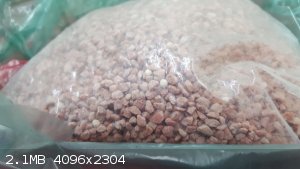werdy666
Harmless

Posts: 9
Registered: 19-1-2021
Location: NSW, Australia
Member Is Offline
Mood: Chilled
|
|
KCl or KHCO3 / K2CO3 from KNO3
Hi,
This might sound strange as most information I can find is to make potassium nitrate from Potassium salts.....
Is there a way to KCl or KHCO3 / K2CO3 from fertilizer grade KNO3.
I Australia I can get a 25kg bag of KNO3 for $63. Works out around $2.50 per kg.
So far I am only able to get Potassium Chloride 1kg for $25 or Potassium Bicarbonate for $20 per Kg.
Thanks for any help you can give me!
werdy666
|
|
|
B(a)P
International Hazard
    
Posts: 1139
Registered: 29-9-2019
Member Is Offline
Mood: Festive
|
|
You might find some ideas here.
Potassium nitrate
Edit, this time with a working link
[Edited on 25-1-2021 by B(a)P]
|
|
|
UC235
National Hazard
   
Posts: 565
Registered: 28-12-2014
Member Is Offline
Mood: No Mood
|
|
KCl is often available extremely cheaply as water softener salt. I'm not sure how common this is in Australia, but I found at least one site where it
was available.
Boiling KNO3 solution with excess HCl should expel all the nitrate as NOCl. Repeated boiling will allow isolation of pure KCl. A similar approach is
used in small scale precious metals refining to remove excess HNO3 that complicate precipitation of gold after dissolving in aqua regia.
|
|
|
Johnny Cappone
Hazard to Self
 
Posts: 74
Registered: 10-12-2020
Location: Brazil
Member Is Offline
|
|
Have you ever looked for potassium chloride as a fertilizer? It is generally widely available, and I would be really curious if someone could get
nitrate this way, but not chloride.
Just yesterday I went to the agricultural supply store to buy some medicine for our sick dog and I took the opportunity to get some KCl, it cost me
only US$ 0.75 per 1kg. This salt, as it is presented in granules for use in agriculture, needs to be crushed and recrystallized (with an intermediate
stage of filtering insoluble contaminants) so it can become useful in the laboratory, which certainly represents some work, but I can't imagine a
cheaper potassium source.
25 AUD per 1kg of KCl seems to me a bit exorbitant, perhaps justified only if it is an analytical reagent.

|
|
|
woelen
Super Administrator
        
Posts: 8034
Registered: 20-8-2005
Location: Netherlands
Member Is Offline
Mood: interested
|
|
Maybe look for a source for food grade KCl? Where I live, I can buy snow white 99.9% pure KCl, EUR 15 for 2.5 kg, EUR 25 for 5 kg. More expensive than
the fertilizer grade stuff, but it is very pure and can be used immediately. Still MUCH cheaper than your source, at 25 AUD for 1 kg.
|
|
|
Fyndium
International Hazard
    
Posts: 1192
Registered: 12-7-2020
Location: Not in USA
Member Is Offline
|
|
For me there are two sources for it: brewery which sells it for 10€/kg and fertilizer which sells it for 40€ for 25kg bag, but the latter may not
deliver unless a full pallet is ordered or shipping may be huge.
Meanwhile, ordering a 25kg bag for 60€ including shipping from eBay from the other side of Europe is basically the cheapest for me currently. Just
where in the devil I'd use 25kg of potassium chloride?
The issue is that K2CO3 has solubility of over 100g per 100mL while KCl has 27g and KNO3 13g. So attempting to crash this out will result only
recovery of KNO3 with impurity of either.
Potassium method for getting pure nitrates for reagent use is very handy though, as it has very steep sol curve, allowing to extract any high
solubility nitrate, for ex AN from very impure feed into very pure KNO3. Using less than eq amount of KCl will precipitate zero KCl along with the
nitrate, leaving all other stuff in solution. KNO3 is non-hygroscopic allowing easy drying and is thermally and chemically much more stable than AN
and will not release any parallel volatiles when heated or mixed(with strong acid).
|
|
|